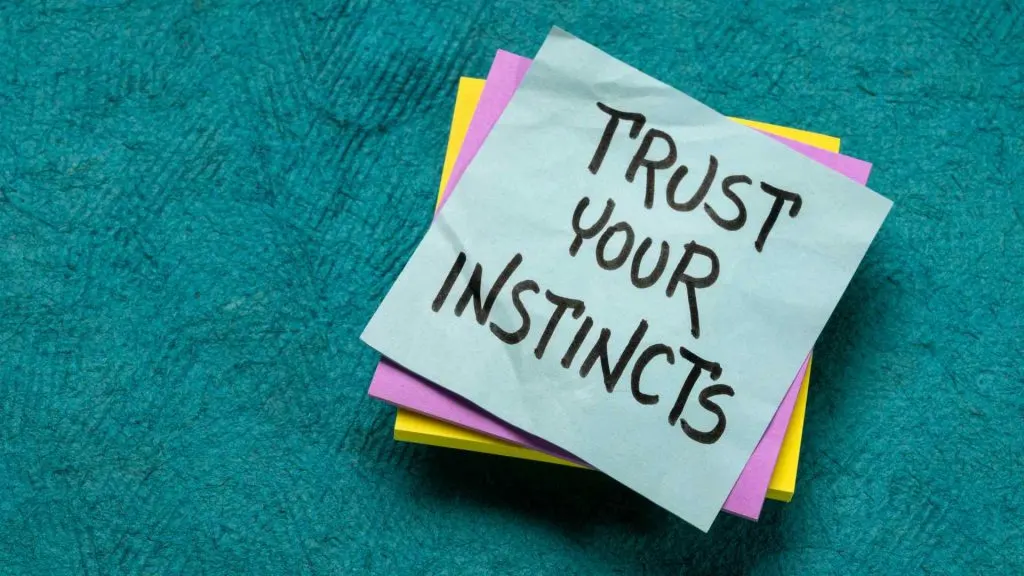When faced with tough decisions, sometimes it’s best to trust your gut.
Following your instincts can lead to unexpected opportunities and exciting adventures. It’s the contrast between overthinking and simply going with what feels right.

Science Behind Intuition
Subconscious Processes
Intuition is influenced by subconscious processes, where our brains make quick judgments based on past experiences and patterns.
These processes occur rapidly and without conscious awareness, guiding us in decision-making even when we can’t explain the reasoning behind it.
Our subconscious mind stores a vast amount of information, allowing intuition to draw upon this knowledge effortlessly.

The brain’s ability to process information subconsciously plays a crucial role in intuitive decision-making. Regions such as the amygdala and insula are involved in processing emotional cues, influencing intuitive responses.
Emotions act as signals that help us navigate complex situations, enhancing our ability to trust our instincts in various scenarios.

Evolutionary Perspective
From an evolutionary standpoint, intuition has developed as a survival mechanism.
Early humans relied on quick decisions to avoid danger and secure resources, leading to the evolution of intuitive thinking.
This instinctual response helped our ancestors adapt to unpredictable environments, ensuring their survival amidst various challenges.
Evolutionary psychologists suggest that intuition may have provided an advantage in critical situations, allowing individuals to react swiftly to threats or opportunities.
This rapid decision-making process was essential for early humans facing immediate dangers, highlighting the significance of intuition in human history.
Brain Regions Involved
The brain regions responsible for intuitive decision-making include the anterior cingulate cortex (ACC) and the dorsolateral prefrontal cortex (DLPFC).
These areas play vital roles in processing information, evaluating choices, and making decisions quickly. By coordinating with other brain regions, they contribute to the seamless integration of rational thinking with intuitive insights.

Differentiating Fear and Intuition
Physiological Responses
When fear strikes, the body’s response is immediate – increased heart rate, sweaty palms, and heightened senses.
These physical reactions are the body’s way of preparing for a threat. In contrast, intuition is a more subtle feeling, often described as a “gut instinct.” The body remains calm, with no intense physical manifestations.
Understanding these physiological responses can help in distinguishing between fear and intuition.
When faced with a decision or situation, paying attention to your body’s signals can provide valuable insights.
Situational Examples
In various scenarios, fear can cleverly disguise itself as intuition, leading individuals astray. For instance, when presented with an opportunity for growth or change, fear may manifest as a sense of unease or doubt. This false sense of intuition can prevent individuals from taking risks that could lead to personal development.
Another common example is in relationships where fear of vulnerability might mimic intuition warning against trust. This internal conflict can hinder genuine connections and personal growth. Recognizing these instances is crucial in making informed decisions.
Recognizing and Addressing Fear-Based Responses
To distinguish between fear and intuition effectively, it’s essential to cultivate self-awareness.
Reflecting on past experiences where fear influenced decisions can provide valuable insights into personal patterns. Seeking feedback from trusted individuals can also offer an external perspective on one’s behavior.
Moreover, practicing mindfulness techniques such as deep breathing or meditation can help calm the mind and differentiate between true intuition and fear-based responses. Engaging in activities that promote self-confidence and self-trust can also aid in reducing the influence of fear.

Overthinking Versus Genuine Intuition
Recognizing Overthinking
Overthinking can cloud our judgment and lead to poor decision-making. When individuals dwell excessively on choices, they often become paralyzed by indecision. This negatively impacts their ability to listen to their instincts.
People who overthink tend to analyze situations endlessly, creating unnecessary stress and confusion. This habit can cause them to second-guess themselves, undermining their confidence in making intuitive decisions.
In scenarios where overthinking dominates, individuals may find themselves weighed down by doubts and unable to trust their gut feelings. This constant mental chatter can drown out the subtle signals of genuine intuition.
Differentiating Genuine Intuition
To distinguish between genuine intuition and overthinking, it’s crucial to cultivate self-awareness. By tuning into your body’s reactions, such as a sense of calm or unease, you can better identify true intuitive nudges.
Trusting your initial instincts is key in differentiating genuine intuition from overthinking. When faced with a decision, pay attention to your first impressions before logic and doubts start clouding your judgment.
Engaging in mindfulness practices like meditation can help quiet the noise of overthinking and allow your true intuitive voice to emerge. By practicing mindfulness regularly, you can strengthen your connection to your inner guidance system.
Real-Life Scenarios
In real-life situations, overthinking can hinder our ability to make intuitive choices. For instance, when deciding whether to accept a job offer, excessive analysis of pros and cons might overshadow our gut feeling about the opportunity.
Another common scenario is relationships, where overthinking can lead us astray from following our heart’s desires. Constantly dissecting interactions or motives can prevent us from truly listening to what our intuition is trying to tell us.
Moreover, in high-pressure environments like sports competitions or exams, overthinking can cause athletes or students to doubt their abilities. This doubt interferes with their natural flow of performance based on intuition and practice.

Strategies to Strengthen Intuition
Mindfulness Practices
Practicing mindfulness can significantly enhance your intuitive abilities. By being present in the moment, you can quiet the noise of everyday life and better connect with your inner voice.
Through techniques like deep breathing and body scans, you can sharpen your intuition by tuning into subtle cues and sensations that guide you towards making more intuitive decisions.
When practicing mindfulness, it’s essential to create a calm environment free from distractions. Find a quiet space where you can focus on your breath and bodily sensations.
By cultivating this awareness, you become more attuned to the signals that your intuition sends, helping you make decisions that align with your true desires and values.
Engaging in mindfulness practices regularly not only strengthens your intuition but also enhances your overall well-being.
Research has shown that mindfulness can reduce stress, improve mental clarity, and boost emotional resilience, all of which are crucial for honing your intuitive skills.
Journaling for Tracking Intuitive Hits
Keeping a journal to track your intuitive hits and their outcomes is a powerful way to strengthen your intuition over time.
By recording moments when you followed your instincts and noting the results, you create a valuable feedback loop that allows you to learn from past experiences and refine your intuitive decision-making process.
In your journal, make sure to write down specific details about each intuitive hit: what prompted the feeling, how you acted on it, and what unfolded as a result.
Reflecting on these entries regularly can help you identify patterns in how your intuition manifests and gain insight into when to trust it most.
Journaling not only serves as a record of your intuitive journey but also acts as a tool for self-discovery and personal growth. It allows you to deepen your understanding of yourself, uncover hidden beliefs or fears that may influence your intuition, and cultivate greater trust in your inner guidance.
Engaging in Creative Activities
Participating in creative activities such as painting, writing, or playing music can be an effective way to tap into intuitive insights. Creativity opens up channels of expression beyond logical thinking, allowing for ideas and inspiration to flow freely from the subconscious mind where intuition resides.
When engaging in creative pursuits, focus on the process rather than the outcome. Allow yourself to explore without judgment or expectation, letting your intuition guide you towards new possibilities and solutions.
This practice not only boosts creativity but also strengthens the connection between your conscious mind and intuitive wisdom.

Trusting Your Gut in Decision Making
Benefits
Trusting your instincts can lead to quicker decisions, especially in time-sensitive situations.
It allows you to tap into your subconscious knowledge, often leading to more accurate outcomes. The sense of confidence that comes from following your gut can also enhance self-trust and self-reliance.
Embracing intuition in decision-making fosters creativity and innovation by encouraging unconventional thinking.
It enables you to consider possibilities beyond logical reasoning, opening doors to unique solutions. Relying on your gut feelings can reduce stress and anxiety associated with overthinking, resulting in a more peaceful state of mind.
Past Experiences
Past experiences play a crucial role in shaping intuitive decision-making. Our brains store memories and emotions from previous encounters, influencing how we interpret new situations.
When faced with similar circumstances, these stored experiences guide our instincts, helping us make informed decisions without conscious analysis.
The brain’s ability to recognize patterns and draw upon past encounters enables quick assessments of current scenarios.
For instance, if someone previously ignored red flags in a business deal that led to failure, their intuition may signal caution when encountering similar signs again. This subconscious learning process enhances decision-making efficiency based on learned lessons.
Successful Outcomes
Trusting your gut has led many individuals to remarkable successes across various fields. In the business world, entrepreneurs like Steve Jobs trusted their intuition when developing groundbreaking products such as the iPhone.
Jobs famously stated, “Have the courage to follow your heart and intuition.” This approach resulted in Apple revolutionizing the technology industry.
In sports, athletes often credit their success to instinctual decisions made during critical moments. Tennis player Serena Williams is known for her ability to trust her instincts under pressure, allowing her to make split-second decisions that secure victories. By listening to their inner voice, athletes can perform at their peak levels when it matters most.

Interpreting Intuition Signals
Decoding Methods
Intuition often communicates through gut feelings, physical sensations, and emotional responses. Pay attention to these cues as they can provide valuable insights into various situations.
Understanding the subtle shifts in your body’s reactions can help you interpret intuition signals more effectively. For instance, a feeling of unease in the stomach might indicate a warning sign, prompting you to reconsider a decision.
Intuition also manifests through inner knowing or a strong conviction about a particular course of action. This deep sense of certainty can guide you towards making choices aligned with your true desires and values.
Techniques for Clarity
To decode intuitive signals accurately, practice mindfulness and self-awareness. By staying present in the moment and tuning into your inner feelings, you can better discern the messages your intuition is sending.
Another effective technique is to keep a journal where you record instances when your intuition proved right. Reflecting on past experiences can help you identify patterns and strengthen your ability to trust your instincts in the future.
Engaging in activities like meditation or yoga can also enhance your connection with your intuition. These practices promote relaxation and mental clarity, allowing intuitive insights to surface more easily.
Importance of Listening
Listening to the subtle cues from your intuition is crucial for making well-informed decisions. When faced with uncertainty, trusting your gut feelings can lead to outcomes that are in alignment with your authentic self.
By honing your ability to interpret intuition signals, you empower yourself to navigate life’s challenges with greater confidence and clarity. Embracing these intuitive messages opens up new possibilities and helps you tap into your inner wisdom.
Trusting your instincts not only fosters self-trust but also strengthens your overall decision-making skills. When you learn to listen attentively to what your intuition is telling you, you cultivate a deeper connection with yourself and the world around you.\

Health and Safety Instincts
Biological Basis
Our instincts for health and safety are deeply rooted in our biology. The brain’s amygdala, known as the “fear center,” plays a crucial role in processing threats.
It triggers the fight-or-flight response when danger is perceived. This automatic reaction is essential for survival, helping us react quickly to potential harm.
Moreover, evolutionary psychology suggests that these instincts have developed over time to protect us from harm. For example, feeling uneasy in a dark alley at night may stem from our ancestors’ experiences with predators. This biological wiring prompts us to stay alert and avoid risky situations instinctively.
research shows that gut feelings are often linked to the enteric nervous system in our digestive tract. This “second brain” communicates with the primary brain through the vagus nerve, influencing our emotions and decision-making processes. Tuning into these bodily cues can provide valuable insights into potential dangers or risks.
Tuning into Bodily Cues
To enhance your ability to follow your health and safety instincts effectively, it’s crucial to pay attention to subtle bodily signals.
Listen to your gut feelings – those intuitive nudges that signal something is amiss or unsafe. These sensations can manifest as a knot in your stomach or a sense of unease in certain situations.
Practice mindfulness to cultivate self-awareness and better understand your body’s responses.
By being present in the moment and focusing on physical sensations, you can sharpen your intuition and make more informed decisions. Engaging in activities like meditation or deep breathing exercises can help you connect with your inner voice.
Furthermore, reflect on past experiences where following your instincts led to positive outcomes. Recall instances where listening to your intuition prevented potential harm or danger. By learning from these experiences, you can strengthen your trust in your instincts and develop a heightened sense of awareness in similar situations.
Role of Intuition
Intuition serves as a powerful tool in safeguarding our personal well-being by providing valuable insights beyond logical reasoning.
Empower yourself by acknowledging and honoring your intuitive impulses when it comes to health and safety decisions. Trusting these instincts can lead to better outcomes and prevent unnecessary risks.
Embrace self-trust as you navigate various scenarios by relying on your intuition as a guiding force.
Whether it’s choosing a safe route home or making important health-related choices, tapping into your inner wisdom can offer clarity amidst uncertainty. Remember that intuition often operates beyond conscious awareness, offering unique perspectives on potential dangers.

Relationship Intuition
Trusting Intuition
Intuition in relationships often serves as a silent guide, nudging individuals towards decisions that their conscious mind may struggle with.
This innate sense can be a powerful tool in assessing the dynamics between partners. Trusting your intuition means paying attention to subtle cues and gut feelings that arise in various interactions.
Intuitive insights can offer a deeper understanding of underlying emotions and unspoken communication within a relationship.
These instinctual responses can help individuals navigate complex situations with more clarity and authenticity. By acknowledging and acting upon intuitive prompts, individuals can foster healthier connections based on mutual respect and understanding.
Listening to your intuition involves tuning into your emotions and bodily sensations during interactions with your partner.
These intuitive signals may manifest as feelings of comfort, unease, or excitement in different scenarios. Recognizing and interpreting these signals can provide valuable insights into the true nature of the relationship, guiding individuals towards informed decisions.
Enhancing Relationship Satisfaction
Relationship satisfaction is closely intertwined with one’s ability to recognize and honor their intuitive responses within the partnership.
When individuals trust their instincts and communicate openly about their feelings, it fosters a sense of emotional safety and vulnerability in the relationship. This openness lays the foundation for deeper intimacy and connection between partners.
By incorporating intuitive insights into daily interactions, couples can cultivate a more authentic and harmonious bond.
Valuing each other’s intuitive perspectives promotes mutual respect and empathy, leading to a greater sense of emotional fulfillment within the relationship. When both partners prioritize listening to their intuition, it creates a shared language of understanding that transcends verbal communication.
Embracing intuition in relationships also allows individuals to address underlying issues proactively, fostering growth and resilience within the partnership.
Recognizing patterns based on intuitive feedback enables couples to navigate challenges collaboratively, strengthening their bond over time. This heightened awareness paves the way for constructive dialogue and mutual support in times of conflict or uncertainty.
Nurturing Interpersonal Connections
Nurturing interpersonal connections through intuition involves cultivating self-awareness and emotional intelligence within the relationship dynamic.
Acknowledging each other’s intuitive responses fosters empathy and compassion, enhancing the overall quality of communication between partners. This shared awareness creates a supportive environment where both individuals feel seen and understood.
Trusting intuitive feelings in interpersonal connections empowers individuals to make authentic choices aligned with their values and desires.
When partners honor each other’s instincts, it deepens their emotional connection and fosters a sense of security within the relationship. Embracing vulnerability based on intuitive insights strengthens bonds by fostering trust and intimacy between partners.
Incorporating intuitive guidance into decision-making processes encourages couples to approach challenges collaboratively, drawing upon their collective wisdom for solutions.
Balancing rational analysis with intuitive knowing allows for holistic problem-solving approaches that consider both practical considerations and emotional nuances. This integrated approach nurtures resilience in relationships, enabling partners to adapt flexibly to changing circumstances.

When to Rely on Your Instincts
Trusting Your Gut
Trusting your instincts is crucial in situations where quick decisions are necessary. Your gut feeling often comes from subconscious processing of information.
Sometimes, your intuition can pick up on subtle cues that your conscious mind may miss. Trusting your gut can lead to better outcomes in high-pressure scenarios.
In critical moments, listening to your instincts can provide clarity and guide you towards the right path. Your intuition acts as a valuable tool for rapid decision-making.
Advantages of Following Your Intuition
- Swift Decision-Making: When faced with time constraints, relying on your instincts allows you to make quick decisions without overthinking.
- Enhanced Creativity: Trusting your intuition can spark creativity and innovative solutions that rational thinking might overlook.
- Improved Risk Assessment: In uncertain situations, your gut feeling can help assess risks effectively and navigate challenges wisely.
In professional settings, individuals who trust their instincts often showcase adaptability and resilience. Following intuition can lead to seizing opportunities that others might overlook.
Consequences of Ignoring Intuition
Ignoring your instincts can sometimes result in unfavorable outcomes. In instances where individuals dismiss their gut feelings, they may encounter:
- Missed Opportunities: By neglecting intuitive signals, individuals might overlook valuable opportunities for growth or success.
- Poor Decision-Making: Disregarding intuitive insights can lead to making choices that are not aligned with one’s true desires or goals.
- Increased Stress: Ignoring intuition may cause internal conflict and heightened stress levels due to going against one’s inner guidance.

Cultivating Better Decision-Making Skills
Integrating Intuition
Trust your gut feelings when faced with uncertainty, but also analyze the situation objectively. Engage in mindfulness practices to enhance self-awareness and intuition.
Reflect on past experiences where intuition led to successful outcomes, reinforcing its value in decision-making. Seek feedback from others to gain different perspectives and validate intuitive insights.
Embrace a holistic approach by combining intuition with data-driven analysis for well-rounded decisions.
Utilize visualization techniques to tap into subconscious insights during decision-making processes.
Practice active listening to tune into subtle cues and non-verbal communication that may guide intuitive choices.
Balancing Intuition
Maintain a healthy skepticism, questioning intuitive impulses to prevent biases from clouding judgment. Develop critical thinking skills, evaluating both intuitive hunches and logical reasoning before making decisions.
Create a decision-making framework that incorporates intuitive prompts alongside evidence-based analysis.
Stay open-minded to alternative viewpoints, challenging your initial intuitions through rational discourse.
Regularly engage in debates or discussions that require critical analysis and consideration of different perspectives.
Attend workshops or training sessions focused on enhancing both intuition and critical thinking abilities.
Hone Decision-Making Skills
Engage in scenario-based exercises, simulating real-life situations that demand quick decisions based on intuition. Participate in role-playing activities, where you practice responding intuitively to various scenarios under pressure.
Keep a decision journal to track the outcomes of choices made using intuition versus analytical reasoning.
Create a supportive network of peers who can provide constructive feedback on your decision-making processes. Join online forums or discussion groups dedicated to sharing strategies for improving intuitive decision-making skills.
Closing Thoughts
Trusting your instincts is a powerful tool in navigating life’s decisions. By understanding the science behind intuition and learning to differentiate fear from genuine intuition, you can cultivate better decision-making skills.
Strengthening your ability to interpret intuition signals will guide you towards making choices aligned with your true desires. Remember, your gut feelings are there to protect and guide you, so listen closely.
Take the time to hone your intuition through practice and reflection. Embrace the signals your instincts send you and use them as valuable insights into your path forward. Your intuition is a gift waiting to be unwrapped—trust it, nurture it, and let it lead you towards a more fulfilling life.
Frequently Asked Questions
How can I differentiate between fear and genuine intuition?
Trusting your instinct is key. Fear often comes from a place of worry or anxiety, while genuine intuition feels like a deep inner knowing. Reflect on the source of the feeling and whether it aligns with your values.
Is it advisable to always follow my instincts in decision-making?
While instincts can be valuable guides, consider balancing them with rational thinking. Trusting your gut is beneficial in certain situations, but combining it with logical reasoning can lead to more well-rounded decisions.
Can intuition be developed and strengthened over time?
Yes, intuition can be honed through practice. Engage in mindfulness techniques, listen to your inner voice, and reflect on past experiences where your instincts were accurate. As you cultivate self-awareness, your intuitive abilities are likely to improve.
When should I rely on my instincts in relationships?
Your intuition can offer insights into relationships. Pay attention to how you feel around others, notice any red flags or positive vibes, and trust your gut when making decisions about friendships or romantic partnerships.
What strategies can help me interpret signals from my intuition effectively?
Stay attuned to your emotions and physical sensations. Journaling, meditation, and seeking quiet moments for reflection can aid in understanding the messages from your intuition. Practice listening to your inner voice without judgment to decipher its guidance accurately.


